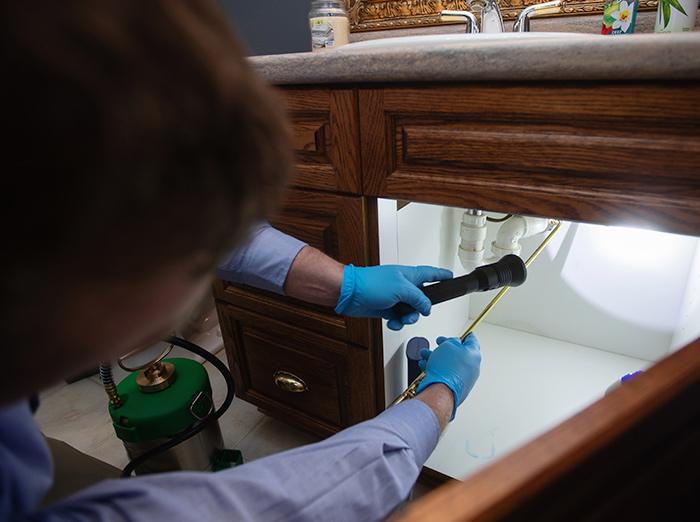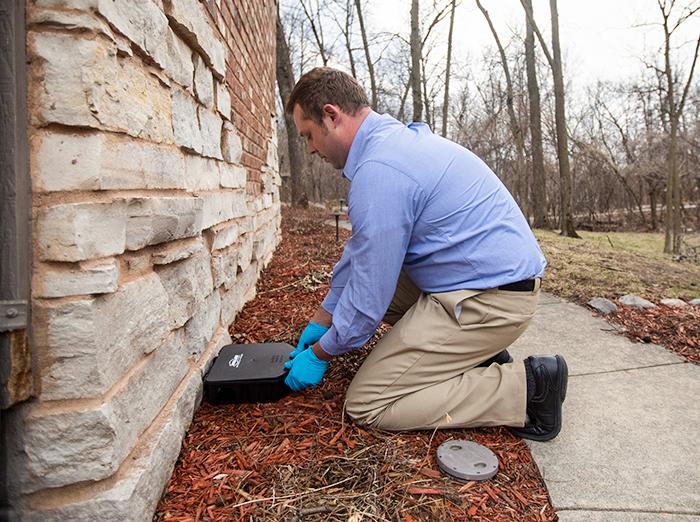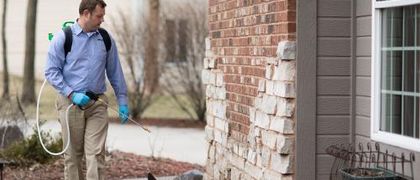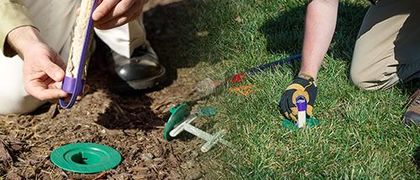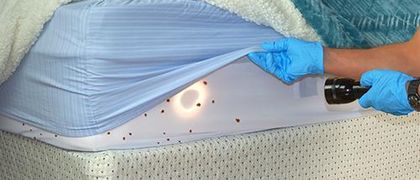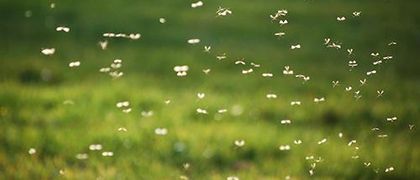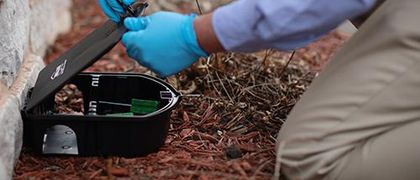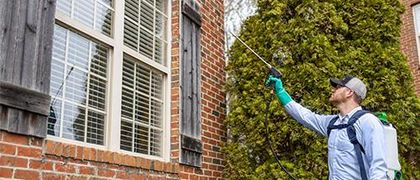Why Wasps Are More Aggressive In The Fall?
If you’ve noticed that wasps seem more aggressive in the fall, you’re not imagining things. As summer ends and cooler weather sets in, wasp behavior changes, making them more likely to be a bother and sting. It’s not just Des Moines, Kansas City, Omaha, or other Midwestern cities that experience this phenomenon yearly; it happens across the country in regions where wasps are highly active in the late summer and fall months. In today’s blog post, we'll identify which types of wasps are most common in our neck of the woods, why they become more aggressive in the fall, and how to avoid stinging encounters.
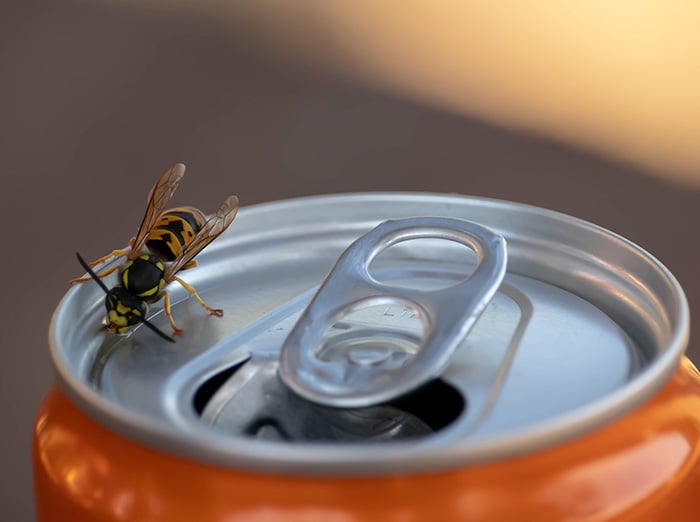
Common wasps in the Midwest
In the Midwest, property owners are more likely to see the following wasps on their property:
- Yellow jackets
Perhaps the most aggressive wasp, especially in the fall, yellow jackets build their nests underground in abandoned rodent burrows and other openings they find. They’ll also nest in walls, voids, and other protected areas. They are attracted to sugary foods and drinks. - Paper wasps
These wasps build umbrella-shaped nests under eaves, in attics, and shrubs, to name a few places. While they are typically less aggressive than yellow jackets, they also threaten people. Paper wasps are also attracted to sweet foods and sugary drinks, especially in the fall. - Bald-faced hornets
Despite what their name suggests, bald-faced hornets are, in fact, a type of wasp. They construct large, football-shaped nests in trees, eaves, overhangs, and other elevated areas. As with the other wasps, bald-faced hornets enjoy sugary food and drinks towards the end of the summer and the beginning of fall when their natural food sources decline.
Why are wasps more aggressive in the fall
Their aggression in the fall is tied to a few key factors:
- Dietary shifts
In the early fall, the dietary needs of a wasp colony shift from protein to sugar. Throughout the summer, wasps primarily feed on protein-rich foods like insects, which they bring back to the larvae in their nests. In return, larvae produce a sweet secretion that adult wasps consume. As fall approaches, the colony stops producing, so there’s less need for protein. Simultaneously, with fewer larvae producing those secretions we mentioned, adult wasps shift to seeking sugar for energy. Ripe fruit, sugary drinks, and food scraps are popular options for wasps. Unfortunately, the dietary shift causes wasps to become a nuisance at outdoor get-togethers in the fall. - Food scarcity
As natural food sources decline, wasps become more desperate and are more likely to scavenge for human foods, again making encounters at barbecues, picnics, and other outdoor events more common. Even taking the trash out to the garbage can lead to stings in the fall. - Increased defensiveness
For a few reasons, wasps become more defensive of their nests in the fall. First, they defend their queen; the colony dies if she’s not around in the spring. Second, worker wasps are nearing the end of their life cycle and really have nothing to lose, so they become more intent on safeguarding the nest. Lastly, cooler weather and environmental changes make wasps more irritable and easier to provoke.
How to avoid wasps sting this fall
Rather than stay indoors and miss out on the fall fun, try out these practical tips to minimize encounters with aggressive wasps:
- Keep drinks and food covered.
- Clear away any food scraps or leftovers promptly.
- Seal trash cans and compost bins.
- Avoid wearing bright colors or floral patterns, and opt for neutrals instead.
- Skip the perfumes and lotions and opt for a deodorant that won’t attract these stinging insects.
If you spend a lot of time outdoors in the late summer and early fall, we also recommend keeping an eye out for and avoiding wasp nests. Stay calm and still if you find a wasp or wasps buzzing around you. Do not swat at wasps, as that can provoke aggression. If they don’t fly off, slowly move away.
What can you do about fall wasps?
Fall isn't the ideal time to start thinking about wasps. It is far better to get in front of wasp problems in the spring by reducing factors that attract them and by quickly removing tiny starter nests. Once the nests are formed in trees, logs, ground holes, or structural cavities, they're challenging to address. We strongly recommend contacting a licensed pest control company for nest removal.
Contact Miller Pest & Termite for wasp control
The Miller Pest & Termite team is here to help property owners in our Midwest service area prevent wasp problems; here’s how:
You can contact us at any time for wasp nest removal. Our service team members have the appropriate protection gear and equipment to remove nests, even in difficult locations to treat.
We also offer MillerGuard, our ongoing home pest control plan that targets wasps, other insects, and rodents that often make themselves pests in and around homes. Check out the plan features below.
Ongoing Home Pest Control Recommendation
Miller Guard
Our signature Miller Guard pest control plan stands out in the industry by giving you Full Pest Coverage and Zero hidden fees. It is designed to eliminate and prevent insect and rodent problems by targeting pest entry and exit points for maximum effectiveness. It includes an initial premium interior application, exterior applications, web removal, and wasp nest removal.
- Ongoing Preventive Services
- 29 Pests & Services Covered
- Initial Premium Interior Application
- Exterior Applications
- Rodent Control
- Wasp Nest Removal
- Cob-Web Removal
- 1-Year Service Agreement
Starting at:
$4999A Month
Free Quote Or Call (515) 518-8864

Additional Miller Guard Details
Pests Covered: Asian Beetles, Boxelder Bugs, Carpenter Ants, Carpet Beetles, Centipedes, Clothes Moths, Drain Flies, Earwigs, Fleas, Fruit Flies, Grain Beetles, Hornets, House Ants, Indian Meal Moths, Mice, Millipedes, Pill Bugs, Rats, Roaches**, Silverfish, Spiders***, Stink Bugs, Wasps, Weevils, Yellow Jackets
Service frequency will vary based on geography. The Miller Guard program does not include the following pests: honey bees, flies, lice, dust mites, mosquitoes, exterior ticks, ornamental/turf pests, slugs, snails, termites, wildlife, birds, and brown recluse spiders.
- Pricing does not include initial fee
- Must have credit card on file
**American, German & Oriental
*** Venomous & Non-venomous
You don't have to wait until wasps have created a menacing presence on your property. Contact Miller Pest & Termite today and let our team of highly trained and fully licensed pest control pros assist!
Get Help Now!


